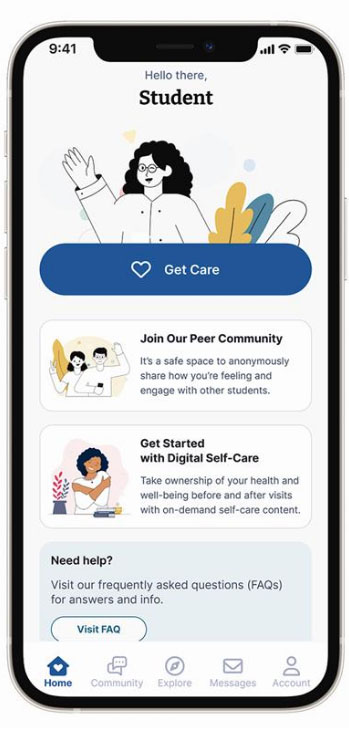Health and Wellness
Your mental and physical well-being are fundamental to your ability to do well academically. This page is your source for resources available to help you be your best self.
The Counseling Center

Prioritizing mental health for students on campus.
ESF offers short-term mental health counseling on campus. Our professionally trained licensed therapists are available by appointment for solutions-focused counseling.
TimelyCare App
ESF students have FREE, 24/7 access to virtual care services with TimelyCare. Students do not need insurance to access TimelyCare services, which include:
MedicalNow: 24/7, on-demand medical care.
TalkNow: 24/7, on-demand emotional support.
Scheduled Counseling: Select the day, time, and mental health provider of your choice. (10 visits per year)
Scheduled Medical: Select the day, time, and medical provider of your choice.
Health Coaching: Support for developing healthy behaviors.
Psychiatry: Advanced mental health care, available upon referral.
Basic Needs Support: Get connected to low or reduced-cost community resources.
Self-Care Content: Yoga and meditation sessions and group conversations with our providers on a variety of health and well-being topics.
Uber for Business
Uber for Business provides transportation for ESF students to and from their medical and health appointments/visits in the Syracuse area. This account links to an existing personal account through Uber. When selecting a ride, choose the business account to charge.
First-year students living in Centennial Hall are automatically added to this program at the start of each Fall semester.
If you’d like to be added to the program, email [email protected] with your name and email address you would like the invitation sent to. Please advise you will need an existing personal account through Uber.
All student access is turned off at the end of the spring semseter, and an email is required to re-enroll in the program for the summer or following year. Violations can result in removal from the program, and students may also be held accountable to the ESF Code of Student Conduct.
Medical Care Resources
All full-time in-person students are required to have health insurance — either through their family’s plan or one affiliated with ESF. This ensures students can access health care services when needed, and that ESF students have access to an affordable, cost-effective private insurance plan with benefits that have been carefully reviewed and approved by the College.
Please note: ESF does not have a health clinic on campus, and ESF students are not eligible to use health services at Syracuse University. Below is a list of off-campus health services available.
![]()
The walk-in clinic will serve as an urgent care for symptoms such as minor burns, ear infections, coughs, colds or mild COVID symptoms, insect bites or minor cuts.
![WellNow Urgent Care [logo]](/student-affairs/assets/wellnow-logo.jpg)
There are several WellNow Urgent Care facilities within an easy distance from campus. Provides a variety of health care services, including x-rays, injuries, physicals, illnesses, and allergies. Accepts insurance.
![Syracuse University [logo]](/student-affairs/assets/su-logo.jpg)
Syracuse University Pharmacy Services
Students can arrange for their prescriptions to be filled at the Syracuse University retail pharmacy in the Barnes Center.
![Planned Parenthood [logo]](/student-affairs/assets/pp-logo.jpg)
Syracuse Health Center of Syracuse
Provides health care, reproductive care, sexually transmitted infection (STI) testing/treatment/vaccines, and transgender hormone therapy (THT).
![State University of New York [seal]](/student-affairs/assets/suny-logo.jpg)
SUNY Student Telepsychiatry Network (STPN)
Students in need of psychiatric care should meet with the ESF Counseling Center to determine if a referral to SUNY-STPN is appropriate. Call (315) 470-4716 to schedule an appointment.
![]()
Upstate Outpatient Pharmacy Financial Assistance Program
Helps patients in financial need purchase necessary medications and supplies.

Provides services, including primary care, dental services, pediatrics, obstetrics and gynecology, eye care and podiatry.

Upstate NAPPI Wellness Institute
This facility hosts many medical services in one location to improve access to care.

Offers a range of health care services for those up to 19 years of age.
![]()
Kinney Drugs Pharmacy Delivery Service
Kinney Pharmacy offers free delivery of prescription drug medication to Syracuse University's pharmacy in the Barnes Center for individuals to pick up at their convenience.

Urgent care facilities available in Cicero and Liverpool NY. Appointments can be scheduled online.
Fitness Center Access

The Barnes Center at SU
ESF students have access to SU’s health, wellness, and recreation complex that serves as a hub for student wellness.
Features: fitness centers, climbing wall, esports, multi-activity court, weight room, basketball courts, dance studios, table-tennis courts, two pools, showers and changing facilities, and locker rooms.
Learn more about the Barnes Center
Interfaith Space
105B Moon is a contemplative space created for prayer, meditation and reflection. It is available to all campus members.
Student Health Insurance
ESF does not have a health center and strongly encourages all students have adequate health insurance. Students are advised to check with their insurance carrier to verify they are covered in the surrounding Syracuse area.
International students are required to have health insurance and are automatically enrolled in the SUNY International Student Insurance Plan. All student athletes at the college are required to have insurance. The college does not provide insurance for athletes. Student Athletes are required to verify they have insurance and must complete the student athlete checklist prior to any participation. Student-Athlete Checklist - SUNY ESF.
Insurance Options for Students
Students are recommended to explore if they can be added to their parent/guardian’s health insurance plan. In NYS, dependents are eligible to be on their parent/guardian’s plan until age 26. Students can also explore if they are eligible for health insurance through their job, even as a part-time employee.
All full time domestic students are eligible to participate in the ESF Student Health Insurance Plan. Policy details and enrollment deadlines are on our partner's website.
NYS Health Insurance Marketplace offers additional options, you will need to gather information prior to completing the application. The total application will take about an hour to complete. Their website also includes Health Insurance Navigators which can provide enrollment assistance. Students outside of NYS can visit here to find coverage in their state.
Immunization Requirements
New York State law, SUNY policy, and Syracuse University policy direct the MMR, meningococcal meningitis, and COVID-19 requirements for ESF students.
MMR (measles, mumps, and rubella)
All students born after January 1, 1957 who are registered for six (6) or more, in person credits must demonstrate proof of immunization for measles, mumps, and rubella. Students are required to upload their MMR documentation through the ESF Wellness Portal before the first day of new student orientation.
Any student who believes they should be exempted from the MMR requirements must apply for and be granted an exemption by uploading their request and supporting documentation through the ESF Wellness Portal before the first day of Orientation.
Meningococcal meningitis
All students must acknowledge that they have received information about meningitis vaccinations and have made an informed decision to receive or decline an immunization against meningitis. Students are required to upload their meningococcal meningitis documentation through the ESF Wellness Portal before the first day of new student orientation.
Online Only Students
All online only students must log into the ESF Wellness Portal and complete the online only exemption request.
COVID-19
Vaccination against COVID-19 is not required by New York State or SUNY.
Login Instructions
- Open a new Incognito window in Chrome and enter this link: esf.medicatconnect.com
- It will prompt you to log in using Microsoft. Use the same credentials used for your student portal. This is your ESF ID followed by "@esf.edu" and your ESF password.
- After you enter your credentials, it will queue DUO (our Multi-Factor authentication). You will have to install DUO as well.
- After you have logged in, instructions for the required Immunizations and Forms will be on the landing page.
Watch this tutorial that walks through how to use the ESF Wellness Portal:
Opioid Overdose Assistance
All resident assistants and live-in professional staff of Centennial Hall have been trained in and have access to Naloxone for the treatment of a suspected opioid overdose. Additionally, several staff in Student Affairs are trained in the use of Naloxone (Narcan) to treat a suspected opioid overdose.
Drug-Free Schools & Colleges
Enacted in 1989, the Drug-Free Schools and Communities Act (DFSCA) has been instrumental in shaping substance abuse prevention efforts at institutions of higher education. The DFSCA requires colleges that receive federal funding implement drug and alcohol abuse prevention programs for their campuses and notify members of their community of these initiatives and resources available.

![TimelyCare [logo]](/student-affairs/assets/TimelyCare-m.jpg)